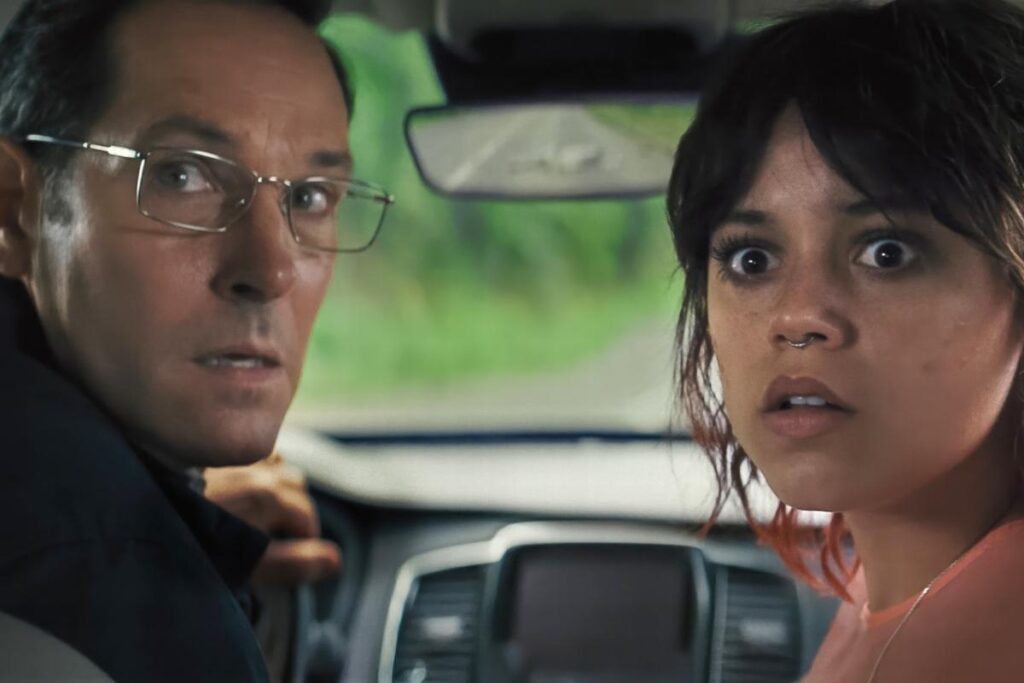Death of a Unicorn (now streaming on VOD platforms like Amazon Prime Video) is an arthouse-adjacent mythological-creature-based horror comedy – call the subgenre chupacabracore, but only if you must – that A24 surely hoped would stir up a bit of crossover success. It had potential, rooted in the casting of Wednesday and Beetlejuice Beetlejuice star Jenna Ortega and genial everyguy/funnyguy Paul Rudd, and an idea that could be amusing if it could push past the cliches of its it’s-not-a-cute-animal-it’s-a-terrifying-beast conceit. The feature directorial debut by Alex Scharfman – which also boasts Midsommar and Hereditary director Ari Aster as a producer – didn’t quite click with audiences though, grossing $16 million in theatrical release. That, coupled with its on-the-sleeve weirdness and propensity for ooey-gooey gore, sets it up to be a potential cult favorite.
The Gist: Schumcky dad Elliot Kintner (Rudd) and his surly college-student daughter Ridley (Ortega) are tooling down the road in the Canadian Rockies when a perfect confluence of ridiculous events occurs: First, a Cocteau Twins needle drop segues into a shot of a cave in the mountains from which emanates strange neighing/growling noises, which is surely nothing, move along, move along. Next, Elliot has a sneezing fit and swerves the rental Volvo a bit and slams into a horse with a skull boner that happened to wander into the road. Yes, that would be a unicorn. The mythological creature. A cryptozooligist’s sopping dream. And it’s not dead. Its iridescent purple blood pools on the pavement and it makes upsetting sounds as it gasps for air. Ridley touches its horn and has a Final Reel of 2001 Psychedelic Experience, then Elliot grabs a tire iron and puts it out of its misery. They arrive at their destination with a banged-up station wagon and the dead unicorn in the cargo hold, thus establishing Act I of Death of a Unicorn as an instance of The Obvious Secret That Will Not Be Hidden.
The Kintners destination? The sprawling wooded estate of Elliot’s employer, Big Pharma honcho Odell Leopold (Richard E. Grant), who’s dying of cancer. Elliot’s a corporate lawyer who’s helping Odell, his wife Belinda (Tea Leoni) and their son Shepard (Will Poulter) sort through their business affairs. Elliot’s a nervous type who routinely insists to Ridley that he’s trying to get in good with these slimy money-havers for the sake of their future financial well-being, part of his promise to their late wife/mother that he’d take good care of their kid. Well, he doth compromise himself a bit much to be in the same room with the Leopolds, who look like they smell like they’ve been marinating in the $2,000-per-bottle whiskey of gross privilege since the opioid epidemic was in its infancy. Elliot desperately wants to hide that he and Ridley are a bit shaken by what just happened back on the road, namely, hitting a creature that isn’t supposed to exist, but is supposed to be dead, which it isn’t, because it’s bleating and kicking in the back of the Volvo. Its survival coupled with the establishment of supporting characters as greedy asshats sets up Act II, The Attempt to Exploit the Obvious Secret for Personal Gain.
And so the Leopolds’ grimlady head of security murders the unicorn for good, notably because it’s not at all a sweet and gentle creature, but in fact is an aggressive beast with large teeth and a violent streak. Curious! Odell calls in his pharma lab science doers (Sunita Mani and Steve Park) to examine the corpse. They determine that the horn has healing properties, so they grind it up and put it in Odell’s IV bag and cure his cancer. Meanwhile, Ridley does what you or I would do in this situation – find something on the internet to scare ourselves with. As an art history studier like her mom, she reads up on medieval unicorn tapestries that give her hints about the nature and history of these animals. And so we have a right brain vs. left brain, hippies vs. capitalists conflict, but neither side really has the oxygen to be the voice of reason, which is too bad, because up yonder over them there hills is an ominous pseudo-aurora borealis accompanied by the loud echoes of angry neighs. Thus, the arrival of Act III, The Secret’s Revenge on Its Exploiters.
What Movies Will It Remind You Of?: A blatant Alien 3 homage shot tells us where Scharfman’s influences lie. Otherwise, Death of a Unicorn takes some creature-feature stuff (Predator and A Quiet Place come to mind), give it a mythological tweak (like, um, Harry and the Hendersons? Is there a Leprechaun in the Wood yet?) and make it the 300th eat-the-rich movie (Parasite, Triangle of Sadness, etc.) in the last half-decade. And its failure to comedically and dramatically capitalize on a promising high-ceiling concept is reminiscent of recent light disappointment Lisa Frankenstein.
Performance Worth Watching: Poulter must have a doctorate in playing hilariously loathsome bro-types (see also: Midsommar), because his take on failson-ism here is vivid and funny, and unlike the other characters, leaps off the screen just enough so we’re tempted to take a couple swings at his squinty smug face. He’s also an ideal spitter-outter of funny throwaway lines such as…
Memorable Dialogue: …this one: “I don’t think I should be in swim shorts for this moment.”
Sex and Skin: None.
Our Take: There’s a moment deep into Death of a Unicorn’s third act when Elliot makes a curious decision and does something stupid, then follows the action up by stating, “I didn’t really plan it out.” I interpreted that as Rudd apologizing for the state of this screenplay, which is haphazardly plotted and structured, and is the weak link of a movie with a promising core premise that falters in its execution. Among its best components: Excellent casting, some inspired camerawork and about a dozen-and-a-half one-liners that pop like firecrackers, enough to make comedy the topline of its genre-mashing description. That’s a long way of saying the film has its moments – but in the end we’re left wondering why it doesn’t come together as anything more cohesive than a series of grisly impalements. Gotta have a motif, I guess.
Scharfman’s screenplay leaves us with the nagging sense that not nearly enough effort was put into crafting these characters, which either need to be pure, unadulterated stereotypes ripe for comic exploitation, or something more closely resembling legitimate human beings. The Leopold family functions as the former, and there’s genuine amusement to be had in the way Leoni twists the murder of an impossibly rare beast for personal gain into a noble cause for the greater good (because to us poors, that sure seems to be how billionaires think, right?). As protagonists, Elliot and Ridley are blah, and the top-billed Ortega, who’s supposed to be the heart of the story, the sympathetic figure among a collection of lost souls, gets lost amidst bloody mayhem, half-assed worldbuilding and on-the-nose caricatures of the sheltered, narcissistic rich.
And so, one finds oneself pondering the split hair in the satire-farce divide as Death of a Unicorn struggles to land on a consistent tone – or become more than just an obvious, ankle-deep criticism of the class divide. The slobs understand the value of a majestic creature, and the snobs just want to kill it and profit; tell me something I don’t already know about the crass and shortsighted exploitation of the environment, please.
Our Call: In the grand forest of cinema, Death of a Unicorn is less like a rare creature worthy of awe, more like your run-of-the-mill shrugworthy squirrel. SKIP IT.
John Serba is a freelance writer and film critic based in Grand Rapids, Michigan.
Read the full article here








